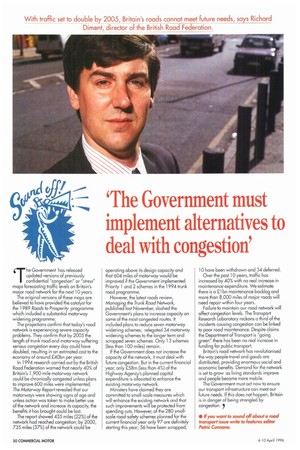'The Goverment must implement alternatives to deal with congestion'
Page 52

If you've noticed an error in this article please click here to report it so we can fix it.
g he Government has released T
updated versions of previously confidential "congestion" or "stress" maps forecasting traffic levels on Britain's major road network for the next 10 years. The original versions of these maps are believed to have provided the catalyst for the 1989 Roads to Prosperity programme which included a substantial motorway widening programme. The projections confirm that today's rood network is experiencing severe capacity problems. They confirm that by 2005 the length of trunk road and motorway suffering serious congestion every day could have doubled, resulting in an estimated cost to the economy of around £40bn per year. In 1994 research carried out by the British Road Federation warned that nearly 40% of Britain's 1,900-mile motorway network could be chronically congested unless plans to improve 600 miles were implemented. The Motorway Report revealed that our motorways were showing signs of age and unless action was taken to make better use of the network and increase its capacity, the benefits it has brought could be lost.
The report showed 435 miles (22%) of the network had reached congestion; by 2000, 735 miles (37%) of the network could be operating above its design capacity and that 604 miles of motorway would be improved if the Government implemented Priority 1 and 2 schemes in the 1994 trunk road programme. However, the latest roads review, Managing the Trunk Road Network, published last November, sloshed the Government's plans to increase capacity on some of the most congested routes. It included plans to reduce seven motorway widening schemes; relegated 34 motorway widening schemes to the longer term and scrapped seven schemes. Only 13 schemes (less than 100 miles) remain.
If the Government does not increase the capacity of the network, it must deal with future congestion. But in the current financial year, only £58m (less than 4%) of the Highway Agency's planned capital expenditure is allocated to enhance the existing motorway network. Ministers have claimed they are committed to small-scale measures which will enhance the existing network and that such improvements will be protected from spending cuts. However, of the 280 smallscale road-safety schemes planned for the current financial year only 97 are definitely starting this year; 56 have been scrapped; 10 have been withdrawn and 34 deferred.
Over the past 10 years, traffic has increased by 40% with no real increase in maintenance expenditure. We estimate there is a 21bn maintenance backlog and more than 8,000 miles of major roads will need repair within four years. Failure to maintain our road network will affect congestion levels. The Transport Research Laboratory reckons a third of the incidents causing congestion can be linked to poor road maintenance. Despite claims the Department of Transport is "going green" there has been no real increase in funding for public transport. Britain's road network has revolutionised the way people travel and goods are distributed, providing enormous social and economic benefits. Demand for the network is set to grow as living standards improve and people become more mobile. The Government must act now to ensure our transport infrastructure can meet our future needs. If this does not happen, Britain is in danger of being strangled by congestion.
s If you want to sound off about a road transport issue write to features editor Patric Cunnane.
















































































































